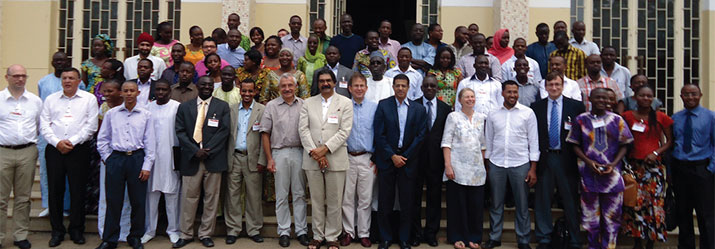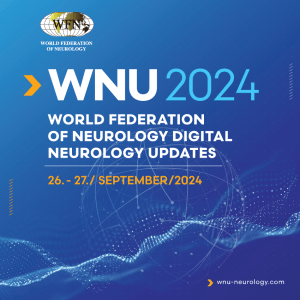
This was a three-day regional teaching course for young neurologists on stroke and movement disorders. It was attended by 53 participants from 23 African countries. 17 of the participants were supported by a scholarship from the EFNS RTC fund.
These individuals were selected by the course organisers from a larger number of neurological trainees who had been put forward by their Head of Department as potential course participants. The remaining 36 were self-funding. Thus these selected participants represented some of the very best trainees from across Africa. The underlying principle was that neurological trainees should receive their training in Africa, and that training would be given jointly by Faculty members from Africa and from the European Federation of Neurological Societies (EFNS) and the World Stroke Organisation (WSO). The participants and teachers were fairly evenly split between Francophone and Anglophone, so the teaching used both languages (slides in English with spoken French translation and vice versa); a very interactive format!
The programme involved one day on stroke and one day on movement disorders, structured as lectures in the morning and in the afternoon small group workshops for case-discussions. The final part of the programme was a half – day dedicated to two workshops: ‘meet the professors’ and ‘how to publish a paper’. The faculty for the stroke day supported by WSO was Thierry Akinodou (Benin), Kamadore Toure (Senegal), Jose Ferro (Portugal ) and Peter Sandercock (UK). The faculty for the movement disorders day, supported by the AAN and the MDS was James Bower (Mayo, USA), Dr Joaquim Ferreira (Portugal), Chafiq Hicham (Morocco), Raj Kalaria (UK), Rufus Akinyemi (Nigeria).
The meeting was organised to a very high standard, and the quality of the lectures was extremely high. However, the most striking aspects of the course were the quality of the questions, the lively discussion, and the very active participation of the trainees in both French and English.
The host of the meeting, Professor Amadou Gallo Diop, from Dakar, emphasised that the guiding principle concerning training for African Neurologists was that the training should take place in Africa. This course really highlighted the value of that approach; the trainees were encouraged to discuss the clinical problems they faced in their daily practice, not only with their peers, but also with Faculty drawn both from Africa and from the rest of the world. This led to very practical, well balanced discussions about the approach to clinical cases, but also how to conduct clinical research in African health care systems. I had the impression that the delegates would have found it much harder to engage so actively had they been attending a teaching course taking place during an international conference in Europe.
In conclusion, this type of course is clearly a very effective model of supporting career development and education for African Neurologists, and I very much hope that the new European Academy of Neurology will build on the success of the EFNS RTC programme in the future.
ACNR 2013;13:5:36

